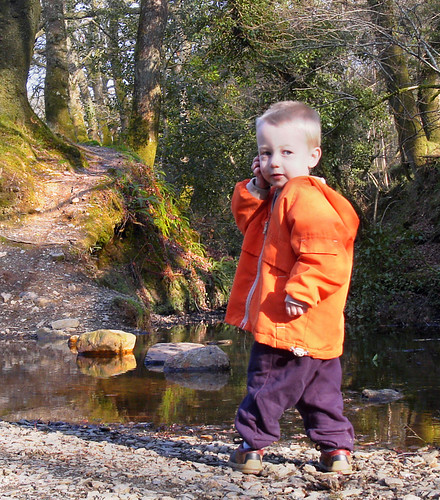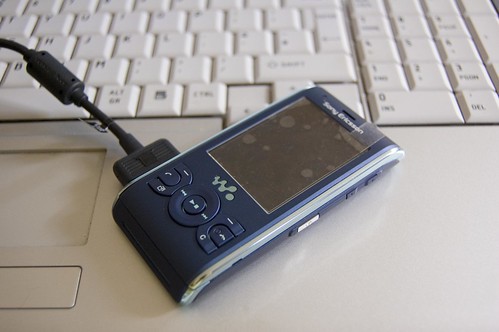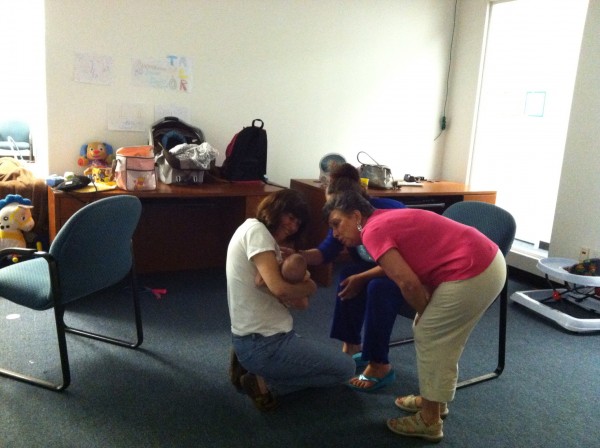“My daughter is out of control, and I don’t know what to do. She screams and screams, and there’s no way to stop her. There’s no talking with her, no reasoning with her, no bribing her, no distracting her, no consoling her. I’m at my wits’ end. I admit, I often resort to yelling at her or spanking her, because I don’t know what else to do. Nothing we have tried has worked. Yesterday, it was because she didn’t want to get in her car seat to go to school. We had to go, or I was going to be late for work, so I wrestled her into the seat while she was kicking and flailing. She screamed throughout the twenty minute ride to preschool. She was fine once we got there. She doesn’t act like this at school, just at home with my husband and me. I just don’t understand it. Why is she like this? My daughter is three. I thought temper tantrums were supposed to become less frequent and less severe once the “terrible twos” were past, but my daughter’s temper tantrums are getting worse and more frequent. Can you help me?”
I understand the frustration you are feeling, but in this situation, your “out of control” child is in need of just as much understanding, support, and compassion as you are. A three year old child who is screaming and melting down on a frequent basis is a child in crisis. She is literally screaming for attention and asking for your help in the only way she knows how to.
Doctor Gordon Neufeld says that the pre-frontal cortex (the thinking, reasoning part of the brain- the “wise leader”) begins to develop from five to seven years of age. Therefore, our expectations are unrealistic if we are expecting our two, three, or four year old children to make sense of their emotions or be reasonable when they are upset. Even children who are five to seven years of age are just in the beginning stages of learning how to regulate their emotions. It is our role to help young children develop the skills to make good decisions, control their emotions and bodies, and develop empathy and self-understanding.
Young children do not have the ability to think rationally about their experiences and feelings and then calmly explain to adults what is troubling them. They are just developing an “emotional” vocabulary; they are prone to experiencing poweful, overwhelming emotions, and they may not know why they are feeling so out of sorts. They rely on the adults in their lives to observe, to listen, to interpret, and to help them manage and express emotions appropriately. When things get too out of balance, they may “act out” their pain, anger, and frustration, or “flip their lids” as Doctor Daniel Siegel (author of The Whole Brain Child) says.
Doctor Siegel does a great job of explaining what is happening in our brains when a melt down or tantrum occurs. He suggests closing your fingers around your thumb to make a fist. Think of this as your brain. The hidden thumb in the center of your palm represents the “downstairs” brain – the amygdala – the “alarm center” and area of big emotions. The fingers that close over the thumb represent the “upstairs” thinking part of the brain. As children grow, they slowly develop the ability to be upset but express feelings calmly, but only if the thinking, “upstairs” part of the brain is still in connection with the “downstairs” emotion/instinct area. When we (a child or an adult) get really upset, we literally “flip our lids”! The fingers rise up and the “upstairs” brain is no longer in connection with the “downstairs” part of the brain, and that’s when a child or an adult may lose control.

A screaming, out of control child (or adult) is begging for help. Most likely your daughter is feeling extremely powerless a lot of the time. Let me share a personal story that may help to illustrate. I am currently in the process of trying to gain custody of my niece who is in the foster care system in the state of Florida. Today, I found myself veering towards a complete and utter loss of control. This has been an arduous process that has involved leaving my home, my job, my friends, and moving across the country. I am coping with time changes, climate changes, diet changes, lack of sleep, lack of any usual daily structure or routine, family illness and stress, and I am desperately missing my husband, my friends, and my cat, who are far, far away.
Given that I am an adult who has a fair amount of experience with loss and change, a fair amount of insight and coping ability, a fair ability to communicate well, and a fair ability to self regulate and self soothe, and given that this move was my choice, and I was prepared for a rough patch, I’ve been doing Okay.
What precipitated today’s melt down was experiencing a feeling of utter powerlessness with regard to the process involved in gaining custody of R. There have been an endless number of hoops to jump through, and we are stalled, three weeks into what should be a fairly straightforward and quick process.
Waiting to be with R. is hard, but I’m capable of waiting patiently if I know that everything possible is being done as quickly as possible to move R. into my care. Unfortunately, this is not the case. Nothing is moving forward, and the reason nothing is moving forward is not because of a lack of cooperation, communication, or effort on my part, but a lack of cooperation, communication, and effort on the part of the social worker involved in the case. Emails and phone calls go unanswered for days. Questions are not responded to with clear answers. Answers to questions change from day to day. Careless mistakes have been made. (My name was spelled incorrectly on a form, which has delayed the results of my fingerprint report which I submitted to days after arriving in Florida. No one notified me, or followed up, and now the whole process has to begin again, and there is another delay.)
There is no one to complain to; there is no one who cares to listen. I am at the mercy of the system, and the system is broken. It is an awful, frustrating feeling. Days go by, and R. remains in foster care, far from me. I don’t know what to expect. I don’t know when this is going to be over. I can’t count on the people who are in power to help, or to advocate for me and R. I can’t even count on them to give me straight answers about what to expect and when. Today, as I screamed and ranted and cried, I realized, “This is a feeling babies and toddlers must experience all the time. No wonder they have temper tantrums.”
Little children have so little control or say over what happens to them. Their experience in the world is limited. They may often feel confused and frustrated- especially if they don’t understand what is happening or why, or they don’t know what is expected of them. If you sometimes hold firm to a limit, and other times, you give in because your daughter wails too loudly, or you lose control of yourself, it may be hard for your little girl to know what to expect and to feel safe. Children are easily overwhelmed and overstimulated. When a child’s behavior is out of control, you can be sure the child is in emotional pain. Your child most needs your support, understanding and empathy when her behavior is most out of control, and it may appear that she least “deserves” it.
What can you to do help your daughter (and yourself)?
You’ve taken the first step, which is to reach out and ask for help and support. That’s a brave and courageous thing to do, and I commend you. You have to understand and take care of yourself so you can understand and take care of your daughter.
Next, ask yourself what stressors (beyond developmental normalcy) might be contributing to your daughter’s melt downs. What is it about the preschool environment that helps her to be able to function well there? Is she getting adequate rest, good nutrition, plenty of active, outdoor play? Are there any changes going on in your family that might be contributing to her stress? Marital or financial problems? A new sibling? Changes in routine? A recent illness? Any or all of these things can contribute to your daughter feeling out of control and overwhelmed. How much TV does she watch? Does she have the opportunity to have some control and choice over things that matter to her? Does she have enough, and regular, unstructured free play time? Have you checked with your pediatrician and ruled out food allergies and/or sensory issues?
If you haven’t already created daily routines and rituals, now is a good time to begin. Young children cope best when they know what to expect and what is expected of them. They can cooperate and participate when they have clear boundaries. Simple, unchanging routines that they can count on give young children a sense of safety and security. Get into the habit of telling your daughter what to expect before it happens, invite her participation, and give her time to transition from one activity to the next.
Make a commitment to respond calmly and with empathy when your girl is “losing it”. Not only is this good modeling, it lets her know that you are on her side, and she can count on you to be the “calm” in a storm. Time out, punishment, yelling, or bribing will do nothing but continue the cycle, because these responses do nothing to address the underlying issues that are causing the behavior.
Finally, I’m including a resource list of suggested reading that I hope will be helpful to you. I’m wishing you the very best, and please do let me know how things are going!
Biting, Hitting,Kicking And Other Challenging Behavior – Janet Lansbury, Elevating Childcare
When Mama Has A Bad Day, and For The Love of A Tantrum– Darci Walker, Core Parenting
Books To Share With Your Daughter To Begin To Build Emotional Literacy– Some of My Recommendations


